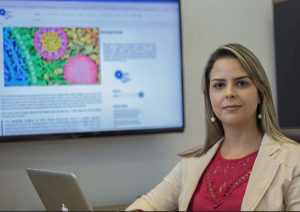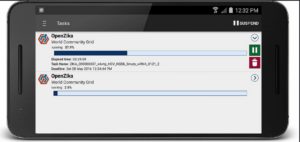
Carolina Horta Andrade, Ph.D., adjunct professor at the Federal University of Goiás in Brazil and the lead researcher on the OpenZika project
The IBM World Community Grid is launching an international study to identify drug candidates to cure Zika, a fast spreading virus that the World Health Organization has declared a global public health emergency.
Enlisting the help of World Community Grid volunteers will enable us to computationally evaluate over 20 million compounds in just the initial phase and potentially up to 90 million compounds in future phases,” said Carolina Horta Andrade, Ph.D., adjunct professor at the Federal University of Goiás in Brazil and the lead researcher on the OpenZika project. “Running the OpenZika project on World Community Grid will allow us to greatly expand the scale of our project, and it will accelerate the rate at which we can obtain the results toward an antiviral drug for the Zika virus.”
IBM and a global team of scientists are inviting anyone with a computer or Android device to join the OpenZika project. Volunteers don’t need to provide time, expertise or money to help; they simply run an app on their Windows, Mac, Linux or Android devices that automatically performs virtual experiments for scientists whenever the machines are otherwise idle.
Through the OpenZika project, World Community Grid will power virtual experiments on compounds that could form the basis of antiviral drugs to cure the Zika virus, which has been linked to serious neurological disorders. With dramatically more speed than possible in a traditional lab, the project will screen compounds from existing molecule databases against models of Zika protein and crystal structures. Screening results will quickly be shared with the research community and general public. Promising compounds would then be tested in the collaborators’ laboratories.
 For the OpenZika project, World Community Grid is working with an international team of researchers led in Brazil by the Federal University of Goiás, and with support from Brazil’s Oswaldo Cruz Foundation (Fiocruz); Rutgers University’s New Jersey Medical School; Collaborations Pharmaceuticals, Inc.; and the Skaggs School of Pharmacy and Pharmaceutical Sciences at the University of California San Diego.
For the OpenZika project, World Community Grid is working with an international team of researchers led in Brazil by the Federal University of Goiás, and with support from Brazil’s Oswaldo Cruz Foundation (Fiocruz); Rutgers University’s New Jersey Medical School; Collaborations Pharmaceuticals, Inc.; and the Skaggs School of Pharmacy and Pharmaceutical Sciences at the University of California San Diego.
The need for a treatment is acute as warmer weather approaches North America, creating an environment more conducive to Zika-carrying mosquitoes, and as international travelers contract and transmit the virus.
Other anti-viral research efforts also hold promise. For example, IBM Research and Singapore’s Institute of Bioengineering and Nanotechnology announced that they have identified a macromolecule that could help prevent deadly viral infections such as Zika. IBM has provided its expertise and resources for other disease outbreaks, such as Ebola. For instance, IBM’s World Community Grid launched a project on Ebola research.
In addition, IBM has helped governments track diseases outbreaks.The company provided a citizen engagement and analytics system in Sierra Leone that enables communities affected by Ebola to communicate their issues and concerns directly to the government. For that public health emergency, IBM Research also created opinion-based heat-maps which correlated public sentiment to reported outbreak locations. IBM scientists have created a free, open source tool that helps scientists and public health officials create, use and study spatial and temporal models of emerging infectious diseases such as Zika.
As part of its citizenship program focused on innovative solutions to societal problems, IBM created World Community Grid in 2004 to address researchers’ critical need for supercomputing power. Partially hosted on IBM’s SoftLayer cloud technology, World Community Grid provides massive amounts of supercomputing power to scientists, free of charge. It does this by harnessing the unused computing power of volunteers’ computers and Android devices. More than three million computers and mobile devices used by nearly three quarters of one million people and 470 institutions across 80 countries have contributed virtual supercomputing power for more than two-dozen vitally important projects on World Community Grid over the last 11 years, at a value of more than $500 million.
World Community Grid has helped researchers identify new potential treatments for childhood cancer, identifying new materials for more efficient solar cells, and helping to identify how nanotechnology can filter water more efficiently. Many of these efforts might not have even been attempted without the free supercomputing power provided by IBM’s World Community Grid.
To perform such computational experiments, OpenZika researchers are using a widely used virtual screening tool called AutoDock VINA, developed by the Olson laboratory at The Scripps Research Institute. At its core, World Community Grid is enabled by Berkeley Open Infrastructure for Network Computing (BOINC), an open source platform developed at the University of California, Berkeley and with support from the National Science Foundation.
Volunteers can support the OpenZika search for a cure by joining World Community Grid. IBM also invites researchers to submit research project proposals to receive this free resource.




